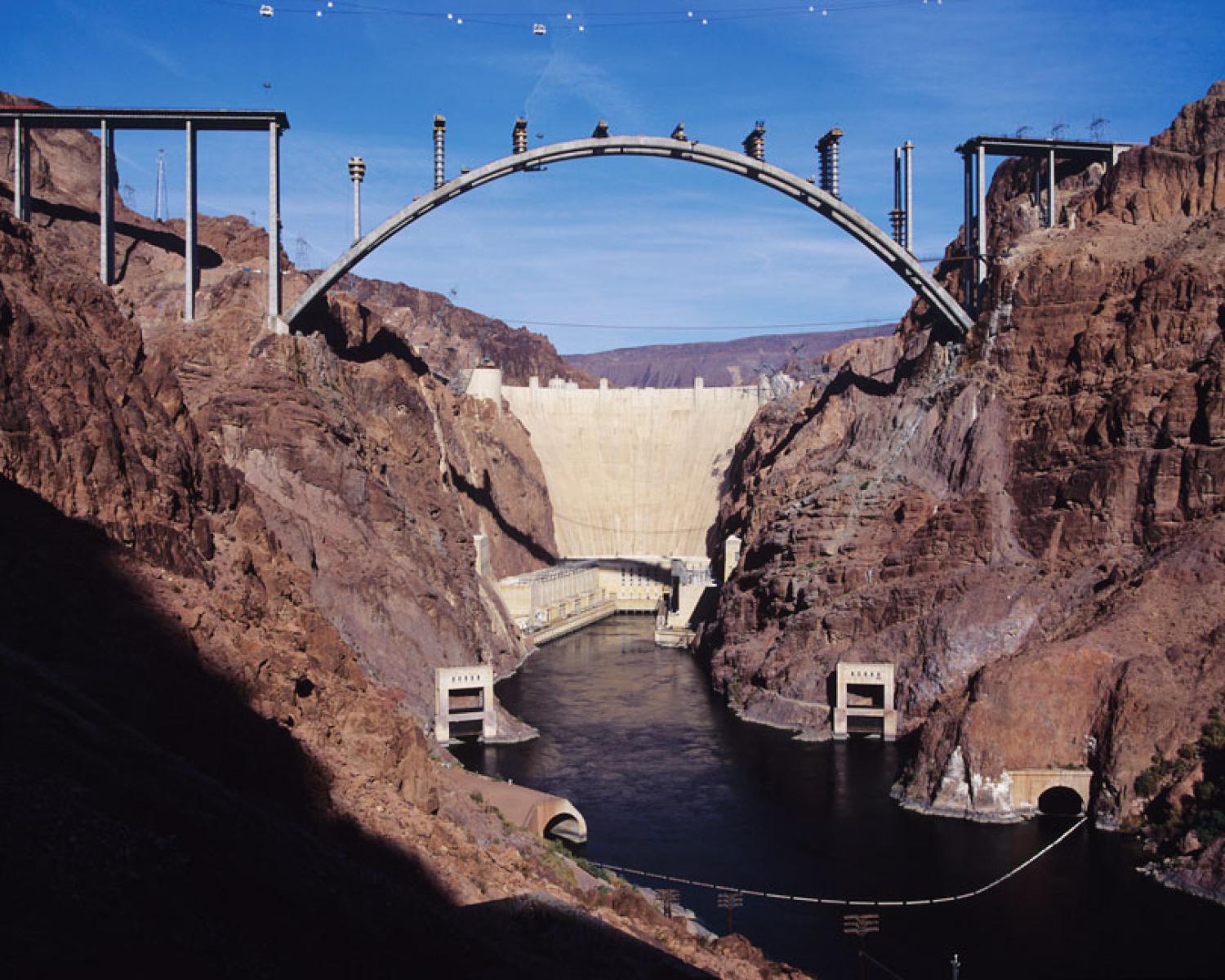
Concrete Results

Dave Zanetell led the $240 million project to build a bridge over the Colorado River. Hoover Dam is in the background. Photo courtesy Hooverdambypass.org
How did Dave Zanetell (MCivEngr’93) guide the construction of the Western hemisphere’s longest concrete arch bridge?
As a seventh grader living in Grand Junction, Colo., Dave Zanetell (MCivEngr’93) penned a career-day essay on white loose-leaf paper about how someday he would be project manager of a dam larger than Hoover.
“We pull it out sometimes at family gatherings and laugh about how accurate it was,” Zanetell says.
Three decades later he found himself working above Hoover Dam.
Today, visitors to the dam that straddles the Arizona-Nevada border can glimpse the nation’s second-highest bridge perched 890 feet above the Colorado River. Zanetell was the man in charge of the soaring project cut into the mountainside. It is the Western hemisphere’s longest concrete arch bridge.
“This was not for the weak of spirit or of skill,” says Zanetell who is engineering director for the Central Federal Highways division of the Federal Highway Administration. “Almost every aspect of this project was either the first time done or the biggest in scale. It required enormous engineering each and every day.”
Dave Zanetell (MCivEngr’93)
Zanetell knew he was in for a challenge in 2000 when he agreed to lead the $240 million project that included a 1,900-foot-long, 88-foot-wide bridge to divert cars from the Hoover’s heavily congested roads. The idea was to provide a quick and safe route between Phoenix and Las Vegas with new stretches of U.S. Hwy. 93.
His colleagues thought it would be career suicide. After all, the much talked about project had been on the drawing boards since the 1960s. For the project to be a success, Arizona and Nevada, as well as several federal agencies, had to agree to contribute money to fully fund its completion.
But Zanetell had just finished a job at Yellowstone National Park and was ready for more.
“From almost every traditional measure there were no guarantees that the project would be built, and there were major obstacles on every single front,” says the 46-year-old. “But I guess you could say I’m a risk-taker.”
The Sept. 11 terrorist attacks expedited the project. In its aftermath, the road across the dam was deemed vulnerable to terrorist attack and closed to commercial traffic. The resulting checkpoints made the bottleneck even worse for cars. Trucks were forced to take a 75-mile detour.
Beginning in 2005 workers braved high winds, freezing temperatures and extreme heat to bring the two sides of the bridge together in the middle. More than 1,200 trade and craft workers and 400 engineers were involved.
An undersized linebacker and captain on his college football team, Zanetell has always appreciated that the team approach to any project is its lifeblood. The bridge was no exception.
“He was very proactive,” says David Goodyear, the bridge’s designer and the chief bridge engineer for San Francisco-based TY Lin International. “He was always looking ahead and thinking about what could go right, what could go wrong and how he could prevent anything that would stand in the way. He was almost clairvoyant in some of the paths he took.”
Then came the crash of 2006. On a windy September day, gusts topping 60 mph knocked over a large crane and sent it crashing to the ground, delaying the project for 18 months.
Zanetell’s quick and steady response ensured the project’s survival. At midnight, he created teams to secure the site, clean up, assess the damage and plot the future course.
“In all that adversity, all the work that we put in getting us unified paid off,” he says. “Nobody flinched. That ultimately was the defining moment in ensuring that the project was going to be done.”
Another low point occurred in November 2008 when a worker was killed while using a hydraulic jack. It was the project’s only fatality.
In summer 2009 it was party time when the concrete arches met in the middle. Zanetell was not there for the celebration. On purpose.
“That needed to be the night for all the trade and craft people, the supervisors, foremen,” he says. “I also wanted to send a signal that ‘Hey gang, we’re not going to have a halftime celebration. We’re going to celebrate at the finish line.”
Last October he and other dignitaries dedicated the Mike O’Callaghan — Pat Tillman Memorial Bridge, named after a former Nevada politician and the ex-Arizona Cardinals defense safety-turned-Army Ranger who died from friendly fire in Afghanistan.
On that day, there was talk of a broader meaning for America, beyond the 30,000 cubic yards of concrete, 16 million pounds of steel and two million miles of cable it took to complete the bridge. It was about still being able to dream big, 75 years after Hoover Dam was built.
As for Zanetell, he isn’t finished quite yet.
“This is really the beginning,” says Zanetell, who credits much of his success to CU. “I want to be part of leading more great civil works projects or other engineering challenges in the future.”

